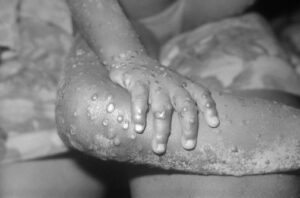Just when we started to realize that COVID is going to continue to be with us, we are struck by a new outbreak of monkeypox!
Recently, the World Health Organization reported more than 1,600 confirmed cases of Monkeypox across 39 countries of which 32 were newly-affected nations. Monkeypox is generally found in Western and Central parts of Africa. Normally there are only a few thousand human cases per year and individuals who contract the virus outside of these regions had recently traveled to Africa.
In the recent 2022 outbreak, however, monkeypox cases have occurred in individuals in separate populations and regions where infections are not normally found. This global outbreak of Monkeypox is unusual and concerning. A recent article in the journal Nature provides an excellent overview of the unique characteristics of this current outbreak.
Monkeypox is a virus-based infectious disease that infects several species of mammals. The causative agent is the Monkeypox virus which is an enveloped double-stranded DNA virus that belongs to the Orthopoxvirus genus of the Poxviridae family. Natural hosts of the virus include dormice, tree squirrels, Gambian pouched rats and non-human primates with rodents suspected as the natural reservoir. And, as we know, humans can be infected as well with transmission occurring from contact with bodily fluids, blood, respiratory droplets and lesions of infected animals and bushmeat (WHO).
There are two clades of monkeypox virus: the West African clade and the Congo Basin (Central African) clade. The name monkeypox originates from the initial discovery of the virus in monkeys in a Danish laboratory in 1958 (WHO).

Image of a young girl with monkeypox lesions on her legs and arms. Credit: CDC.Image of a young girl with monkeypox lesions on her legs and arms. Credit: CDC.
According to the World Health Organization, the first human case was detected in 1970 in the Democratic Republic of the Congo. During the initial phase of monkeypox infection, humans experience swollen lymph nodes, back and muscle aches, extreme lethargy, fever, chills and headache. These symptoms are followed by a skin rash, generally concentrated on the face, arms and legs. The fluid-filled blisters eventually dry up and fall off, similar to chickenpox.
The last few years have highlighted how much a rare disease outbreak or a new disease is a critical concern. However, the fact that treatments and vaccines are available (although not readily or widely as of yet) should prevent monkeypox from affecting the global population in the same manner as COVID-19.
Absolute Antibody is committed to providing quality reagents to help the research and diagnostics community with their research on monkeypox virus. Our catalog contains antibodies to both Monkeypox (Ab02217 and Ab02996) and Orthopoxvirus (Ab02220). We also have antibody against p35 of Orthopoxvirus (Ab02995). Absolute Antibody’s engineering platform allows us to offer these antibodies in various isotype and species formats like rabbit, human and mouse. Contact us if you have any questions or receive a quote.
Latest News
Upcoming Events
Please join us at the following conferences and events. Stop by our booth, or get in touch to arrange a meeting.
See All Dates
 United Kingdom (UK)
United Kingdom (UK)